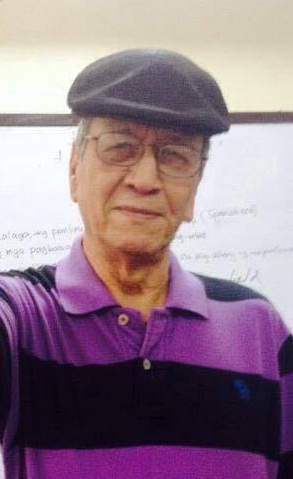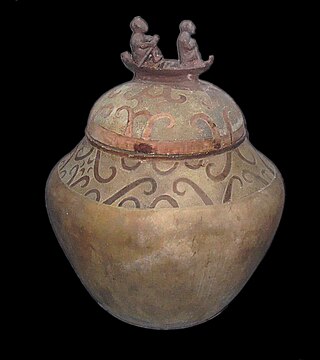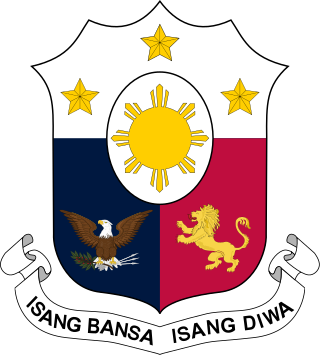
Filipino is a language under the Austronesian language family. It is the national language of the Philippines, and one of the two official languages of the country, with English. It is a standardized variety of Tagalog based on the native dialect, spoken and written, in Metro Manila, the National Capital Region, and in other urban centers of the archipelago. The 1987 Constitution mandates that Filipino be further enriched and developed by the other languages of the Philippines.
Filipino psychology, or Sikolohiyang Pilipino, in Filipino, is defined as the philosophical school and psychology rooted on the experience, ideas, and cultural orientation of the Filipinos. It was formalized in 1975 by the Pambansang Samahan sa Sikolohiyang Pilipino under the leadership of Virgilio Enriquez, who is regarded by many as the father of Filipino Psychology. Sikolohiyang Pilipino movement is a movement that created to address the colonial background in psychology in the country. It focuses on various themes such as identity and national consciousness, social awareness, and involvement, and it uses indigenous psychology to apply to various fields such as religion, mass media, and health.

Teodoro Andal Agoncillo was a prominent 20th-century Filipino historian. He and his contemporary Renato Constantino were among the first Filipino historians renowned for promoting a distinctly nationalist point of view of Filipino history. He was also an essayist and a poet.
Nicanor G. Tiongson is a critic, creative writer and academic from the Philippines. He holds a Bachelor of Humanities degree from the Ateneo de Manila University, and M.A. and Ph.D. in Philippine Studies from the University of the Philippines. A founding member of the Manunuri ng Pelikulang Pilipino, Tiongson is currently Professor Emeritus of Film and Audio-visual Communication at the College of Mass Communication in U.P. Diliman.

Rogelio Lunasco Ordoñez also known as Ka Roger, was a multi-awarded Filipino fiction writer, poet, activist, journalist and educator. He was one of the authors of the iconic Tagalog literature anthology Mga Agos sa Disyerto in the 1960s. He was a contributor to Liwayway Magazine, Pilipino Free Press, Asia-Philippines Leader, Pilosopong Tasyo, Diario Uno and Pinoy Weekly.

The Manunggul Jar is a secondary burial jar excavated from a Neolithic burial site in the Manunggul cave of the Tabon Caves at Lipuun Point in Palawan, Philippines. It dates from 890–710 B.C. and the two prominent figures at the top handle of its cover represent the journey of the soul to the afterlife.

Lope K. Santos was a Filipino Tagalog-language writer and former senator of the Philippines. He is best known for his 1906 socialist novel, Banaag at Sikat and for his contributions to the development of Filipino grammar and Tagalog orthography.
Ligaya G. Tiamson-Rubin, is a Filipino writer. A multiple Carlos Palanca Memorial Awards for Literature recipient, and currently a professor of the University of the Philippines Diliman. Today, she is teaching Filipino 25, Mga Ideya at Estilo under the Department of Filipino and Philippine Literature at the College of Arts and Letters, University of the Philippines Diliman in Diliman, Quezon City.
Efren Reyes Abueg is a well-known and recognized Filipino-language creative writer, editor, author, novelist, short story writer, essayist, fictionist, professor, textbook writer, and anthologist in the Philippines. His works appeared on magazines such as Liwayway, Bulaklak, Tagumpay, Mod, and Homelife.
Ernani Joson Cuenco was a Filipino composer, film scorer, musical director, music teacher and Philippine National Artist for Music. He wrote an outstanding and memorable body of works that resonate with the Filipino sense of musicality and which embody an ingenious voice that raises the aesthetic dimensions of contemporary Filipino music. Cuenco played with the Filipino Youth Symphony Orchestra and the Manila Symphony Orchestra from 1960 to 1968, and the Manila Chamber Soloists from 1966 to 1970. He completed a music degree in piano and cello from the University of Santo Tomas where he also taught for decades until his death in 1988.
Elena Rivera Mirano is a Filipino academic in art studies, a music scholar, choir conductor and singer in the Philippines.

Michael M. Coroza is a Filipino poet, educator, and S.E.A. Write Award laureate.

Isang Bansa, Isang Diwa was the national motto of the Philippines from 1978 to 1986, during the presidency of President Ferdinand Marcos. It was adopted on June 9, 1978 by virtue of Presidential Decree No. 1413. The motto has been criticized and has been denounced as "the slogan of a fascist regime".
The Sentro ng Wikang Filipino, also known the Sentro, is a language academy, research center, and university-based publishing house that is part of the University of the Philippines System (UP). It has offices in various autonomous universities of UP System, the most notable of which is the one housed at the University of the Philippines Diliman that won the Philippine National Book Award for Publisher of the Year by the Manila Critics' Circle. The Sentro is active not just within the UP system due to its mission of "developing and disseminating" the Filipino language according to the provisions of the 1987 Philippine Constitution.

The following is a timeline of protests against Rodrigo Duterte, the 16th President of the Philippines, and his policies. Issues were addressed in the protests including the war on drugs, employment issues, anti-terror law, and the government's response to the COVID-19 pandemic.

Manuel Candelaria Bautista was a Filipino student leader, campus journalist, and activist best known for his contributions as a student leader at the University of the Philippines Los Baños during the Martial Law dictatorship of Ferdinand Marcos.
Pamana is a Filipino educational television series developed by the Sky Foundation and broadcast on Knowledge Channel beginning in 2001. Both this series and Kasaysayan TV were the first original programs to be created by the foundation.
Ramon Guillermo is a Filipino novelist, translator, poet, activist, and academic in the field of Southeast Asian Studies.

Buwan ng Wikang Pambansa, simply known as Buwan ng Wika, is a month-long annual observance in the Philippines held every August to promote the national language, Filipino. The Komisyon ng Wikang Filipino (KWF) is the lead agency in charge of organizing events in relation to the observances.
Gelacio Y. Guillermo Jr. was a Filipino poet, critic, translator, essayist, and revolutionary.












